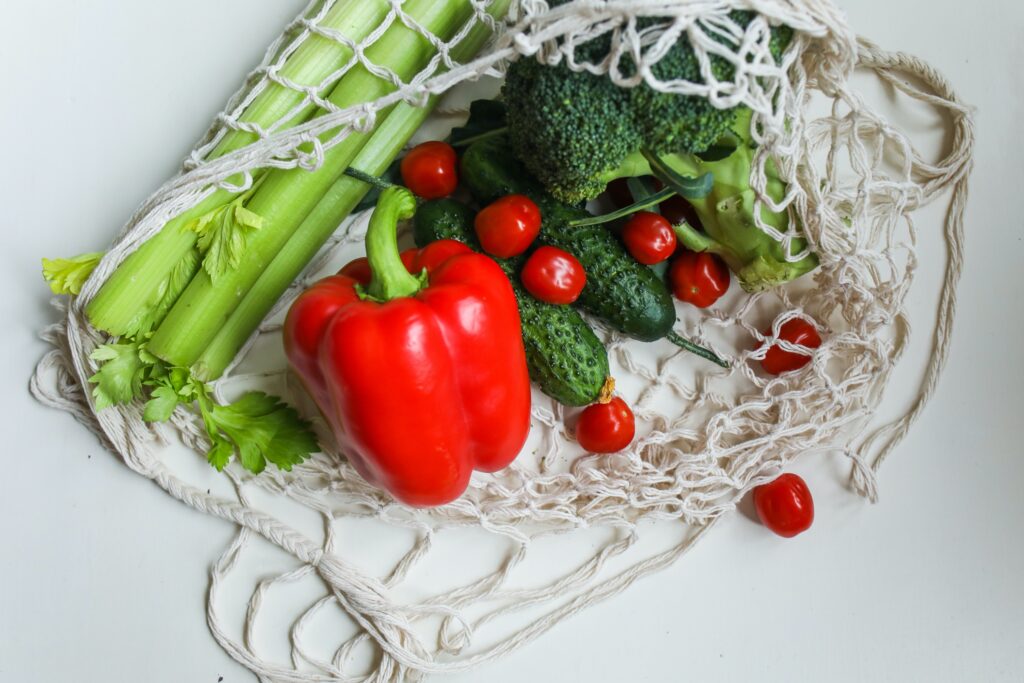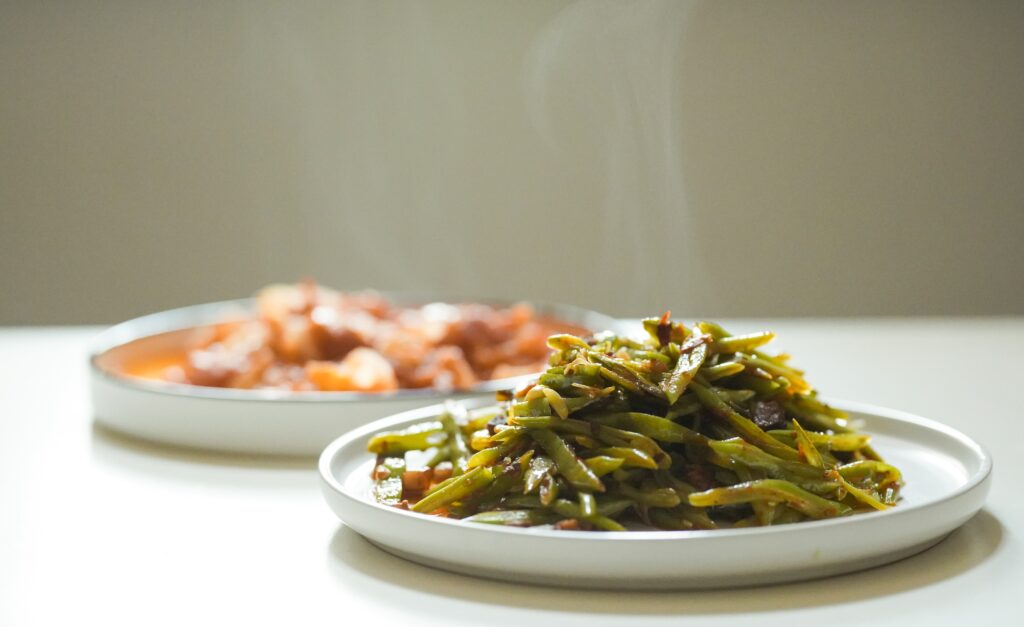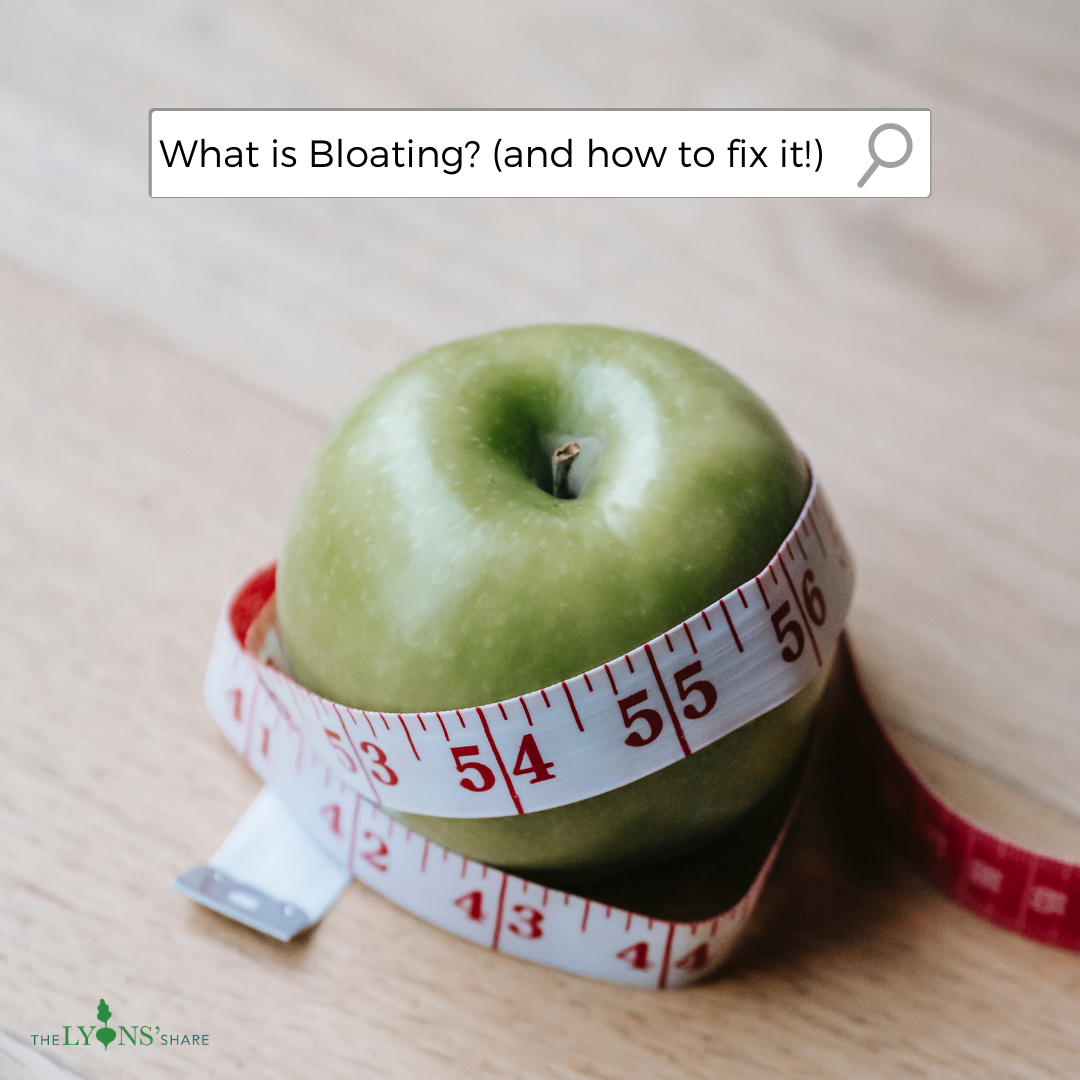Every single day, I have a client telling me they’re feeling bloated or have struggled with bloating for years. And more often than not, they say it in passing, as if it’s an unavoidable fact that we just have to live with and can’t do anything about. That’s not true! Not only is bloating not “normal” (or rather, it probably is normal in the sense that most people have it, but not in the sense that it’s supposed to be that way!), but it’s also completely treatable! For each particular situation, the exact answer is somewhat different, based on what type of bloating they have, what we presume caused it, what they regularly eat, and so many other factors. In this post, I’ll try to break it down for you, so you can treat your own bloating (and hopefully prevent it in the future!).
What is bloating?
What is bloating, anyway? To answer that question, let me first tell you what it’s not. It’s not belly fat. So, if your “bloating” has been coming on over the past few months or years, it’s likely not bloating but belly fat. If you can pinch it, it’s likely belly fat. If it’s constantly there, it’s likely belly fat.
Bloating fluctuates, and doesn’t last more than a day or two. Many people with digestive issues will wake up “not bloated,” and then become bloated by the end of the day. Some people feel bloated only after the weekend or an unhealthy day of eating. Some feel bloated only “at that time of the month.” If what you’re feeling is coming and going regularly, it likely is bloating, and not belly fat.
True bloating is caused by excess gas being trapped in your digestive system. Most often, even though we say our “stomach” is bloated, it’s actually our intestines. Did you know that your stomach is located right under your ribs on the left side of your body? It’s much higher up than most people expect, whereas your intestines are in the middle and lower part of your abdomen (your small intestine is a small tube, over 20 feet in length, coiled in the middle of your abdomen, and your large intestine, or colon, is a larger tube, about 5 feet in length, that goes up the right side of your body, across the middle, and down the left side of your body). So, the intestines are what carry the vast majority of bloat. While bloating is often air, it can also be caused by excess digesting food, stool, or liquid trapped in the intestines as well.

Another type of bloating (that’s slightly different, but I’m still including it here) is water retention, so I’ll include that type as well.
To make it simple, I’ll refer to the three types of bloating as “heavy bloating,” “balloon bloating,” and “puffy bloating.” I’ll describe what causes each type, and what to do about it!
What is “heavy bloating?”
When people describe feeling like they have a brick in their stomach, feeling weighted down and heavy, or feel the “sloshy belly” feeling, they often have what I call “heavy bloating.”
Basically … they are constipated. Yep, it’s often that simple! There’s so much undigested and partially digested food, as well as stool, trapped in their inflamed intestines, that it becomes “stuck.” Truthfully, it’s not actually stuck, but as it sits in the colon (which functions to remove water from stool) for longer and longer, more and more water gets extracted, and the stool becomes harder and harder, which is why constipated stool often comes out pebbly and dry. Not only is that uncomfortable, but any toxins or harmful ingredients that were in the food they initially consumed have the potential to be recirculated through the body, which is why constipation often comes along with brain fog, low energy, and more.
Constipation can be caused by a number of factors, but most often is caused by these:
- Not enough fiber in the diet
- Too much dairy in the diet (see this post)
- Too much inflammatory food in the diet
- Being dehydrated
- Stress
- Lack of movement

Being constipated for a day or two isn’t the end of the world, but being constipated for the long term can be incredibly dangerous, leading to fecal impaction, diverticulitis, and more, so follow the below steps for a week, and if you don’t see symptoms resolve, seek the help of a nutritionist or medical practitioner!
How to resolve “heavy bloating”
If you have “heavy bloating” (or if you are constipated), here are a few things you can do:
- Drink tons of water. Tons! I recommend half your body weight in pounds, in ounces, every day, but if you’re constipated, try to exceed that to get things moving and help your body flush out what’s stopping it up.
- Eat lots of fiber. I highly recommend consuming fiber from vegetables and fruits, especially when constipated, because relying on a fiber supplement regularly can be habit forming, and consuming a fiber supplement when already dehydrated and constipated can cause you to become even more backed up unless you’re incredibly careful to consume it with enough water.

- Make consistent time for a bowel movement. Many people become constipated because they don’t give their bodies adequate time to slow down enough to have a bowel movement. Until you can get yourself on a regular schedule, making time to just sit on the toilet for 10+ minutes at a consistent time can really help your body adjust.
- Reduce inflammatory food. At least until you become more regular (which, by the way, is defined as having 1-3 bowel movements per day, every day), I suggest reducing dairy (which is a common constipation trigger), gluten, added sugar, processed food, and alcohol as much as possible, to reduce the inflammation in your body and allow stool to pass more easily.
- Consider deep breathing or meditation. If you’re constipated because you’re stressed (here are all the ways stress impacts your body!) , I highly recommend carving out 5 or more minutes per day for deep breathing or mediation (here is more on the benefits of meditation!)
- Take a probiotic. Sometimes, an imbalance of gut flora can cause constipation. See this post for all about probiotics (and prebiotics!) and consider trying one (I recommend a few in the post!)
- Try magnesium. Most doctors will have patients drink a significant amount of magnesium citrate to prepare for a colonoscopy, because let’s be honest, that stuff really clears you out. But not only is it not healthy to be that cleared out on a daily basis, but it’s also uncomfortable. I recommend a gentler magnesium (like this one) to spur things on and help your bowels get moving again.
- Try apple cider vinegar. Drinking apple cider vinegar on an empty stomach or before meals has tons of benefits (see many of them in this post). Try 1 tablespoon mixed with 4-6 ounces of water first thing in the morning to get the digestive tract moving.

- Move your body. Simple as it sounds – movement helps tremendously. Move your body in any way you can. Your digestive system will thank you!
What is “balloon bloating?”
When people describe feeling like they have a balloon trapped in their belly, or feeling like they’re several months pregnant, they’re often experiencing balloon bloating. While this can be the result of constipation stopping things up and causing excess gas to be trapped above the impacted stool, “balloon bloating” can have a lot of other causes as well. Here are a few:
- Consuming something you have a food intolerance or sensitivity to
- Swallowing too much air, often from drinking from straws, not chewing enough, or eating too quickly
- Eating too quickly in general
- Consuming beans or cruciferous vegetables
- Eating too much inflammatory food
How to resolve “balloon bloating”
If you have “balloon bloating,” here are a few things you can do:
- Slow down and chew your food! Most people do not realize how quickly they’re eating. Challenge yourself to chew each bite for 15 chews or more, or to put down your fork between each bite. You might be amazed at how odd it feels, because you’re used to eating much more quickly! When we eat too quickly, we’re ingesting large chunks of food, which makes it much harder for our digestive enzymes to do their job of breaking food down into a soupy liquid called chyme that enters your intestines. Plus, when we eat quickly, we’re less likely to realize that we’re full, so we tend to overeat, which can cause balloon bloating itself.
- Consider digestive enzymes. Speaking of digestive enzymes, they’re key players in digestion. They’re secreted by your pancreas, stomach, and small intestine, and they run the chemical digestion of your food. Sometimes, due to stress, viruses, or other factors, our bodies produce fewer digestive enzymes than we need, and supplementing with exogenous digestive enzymes can help kick your body back into gear. Be sure to take the enzymes with meals, especially harder to digest meals, and to get this one or get another one that includes an amylase (to break down carbohydrates), a protease (to break down proteins), and a lipase (to break down fats).
- Try deep breathing before meals. Because of the extreme impact of stress on the body (see this post), our body often isn’t prepared for best digestion when we’re stressed. A few minutes of deep breathing can engage your parasympathetic nervous system (often called the “rest and digest” branch) and help facilitate better digestion.
- Consider cooked vegetables instead of raw. While raw vegetables have a host of health benefits, they might be tough to digest if you’re already experiencing balloon bloating. I recommend switching to cooked vegetables only until the bloating resolves.

- Consider a low-FODMAP diet. FODMAP stands for fermentable oligosaccharides, disaccharides, monosaccharides, and polyols, which basically means short-chain carbohydrates that can be hard to digest. Unfortunately, FODMAPs hang out in a lot of common foods, including “healthy” foods like asparagus, cauliflower, apples, and cashews. If all else fails, consider a low-FODMAP diet (you can use the chart in this post to guide you) for a week or two to see if you adjust well.
What is “puffy bloating?”
As previously mentioned, puffy bloating is slightly different, but I’m going to address it here anyway. “Puffy bloating,” or that feeling of puffiness, particularly in your hands, face, feet, and abdomen, is actually water retention, which can be cause by numerous factors. If you’ve ever gotten on the scale and gained 3 pounds in a day, you’re likely experiencing water retention or “puffy bloating” … it’s very hard to impossible to actually gain 3 pounds of fat in a day. Here are a few things that cause water retention:
- Hormonal imbalance or cyclical fluctuations
- Increased sodium intake or electrolyte imbalance
- Inflammatory food
- High carbohydrate foods
How to resolve “puffy bloating”
If you have “puffy bloating,” here are a few things you can do:
- Drink more water. See above – it helps tremendously in flushing out inflammation.
- Reduce your sodium temporarily. I actually love salt and think it has an important place in our diet, but temporarily reducing it might alleviate bloating. If you’re an athlete, and know you need sodium, consider an electrolyte supplement like Ultima to balance out electrolytes.
- Reduce inflammatory foods. See above – the same explanation applies.
- Temporarily reduce carbohydrates, especially refined ones. Carbohydrates are hydrophilic, meaning that they hang onto water and cause our body to retain it. Temporarily reducing your refined carbohydrate intake can help reduce the feeling of bloating.
- Balance your hormones. Far easier said than done, but working with a health coach or medical practitioner to balance your hormones can help tremendously. This book can be a great start!
If these don’t work…
I work with people with digestive issues all the time. Most can be fixed with tips like these, so I encourage you to try them on your own. However, there are numerous other conditions, including Crohn’s, colitis, IBS, celiac disease, food sensitivities, gut health imbalance, and more that might be behind your symptoms. And there are many people without these conditions who require more complex testing to get to the bottom of the issue. So, if they are not resolving with these tips, please consider working with our team – we’re here to help! You can schedule a free initial consultation here.
Now it’s your turn … Do you struggle with bloating? Which tip will you implement next time you are bloated?


Hi, the link to the magnesium that you recommend in this post is not working. I was just wondering what type and brand you recommend?
Thanks for that, Madi! Link is fixed – try this one for a bit of citrate with other formats combined. https://amzn.to/3OLxfY6